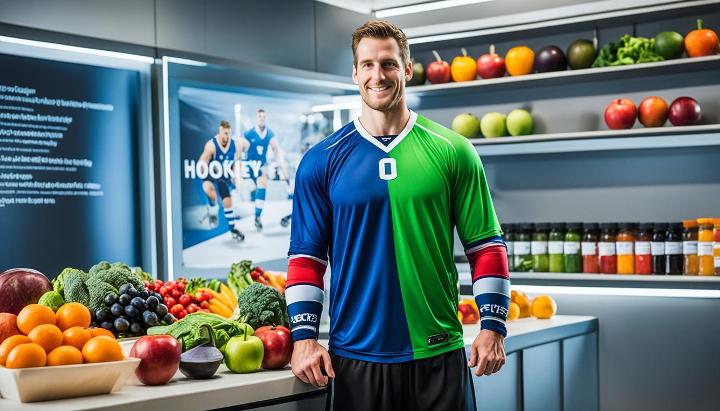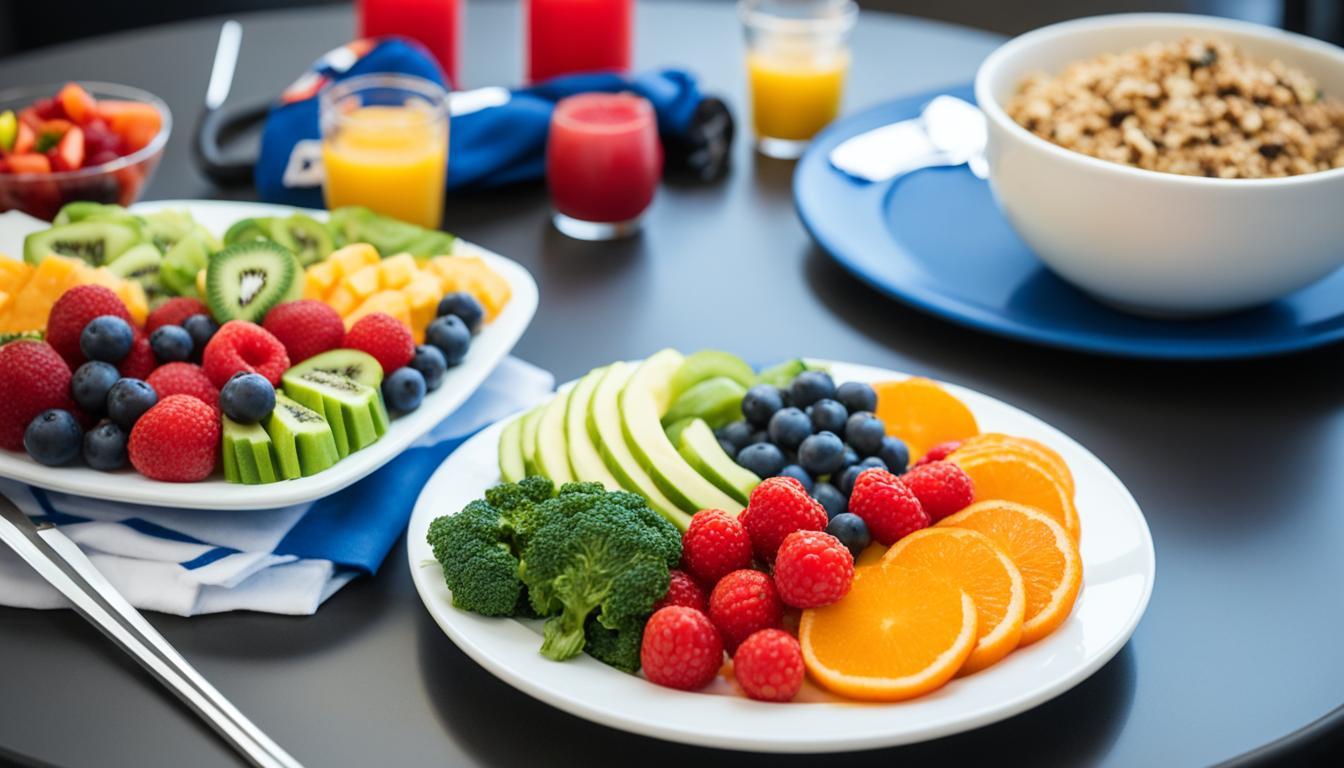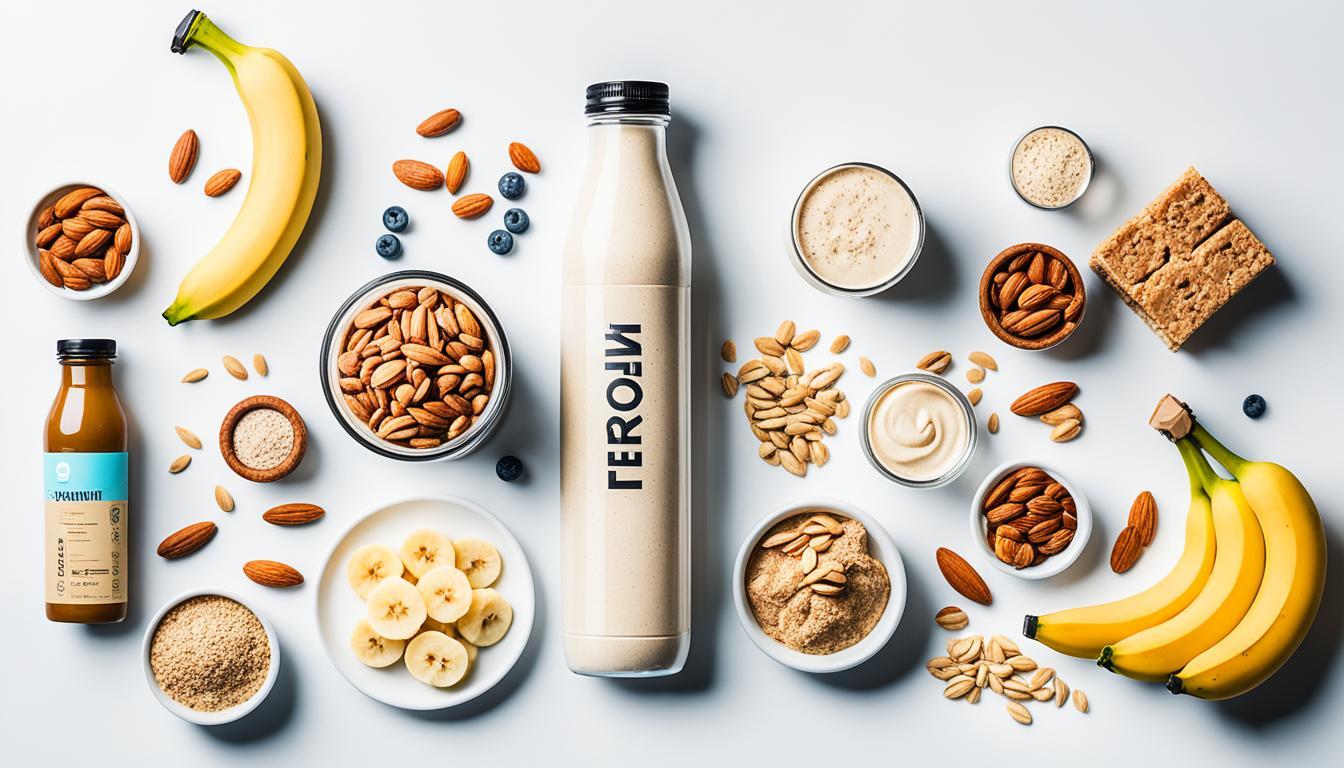Nutrition Guide for Hockey Players: Fuel Your Game

Are you a hockey player wanting to boost your performance? Look no further than your plate to make a difference. Eating right can greatly improve how you play hockey. It gives you the power, helps you recover, and keeps you healthy on the ice. A good nutrition plan is essential. So, what should you eat for hockey?
Key Takeaways
- Proper nutrition can significantly enhance a hockey player's performance, energy, and recovery.
- The body requires specific nutrients, such as carbohydrates and proteins, to fuel the high-intensity and endurance demands of hockey.1
- Maintaining a balanced and well-timed nutrition plan is crucial for hockey players to maximize their potential on the ice.
- Dehydration can negatively impact a hockey player's shooting accuracy, speed, agility, concentration, and coordination.2
- Consistent daily intake of calories, protein, carbohydrates, and fats is the foundation of effective nutrition strategies for hockey players.3
The Importance of Proper Nutrition for Hockey Players
Good nutrition is key for any hockey player's success.1 Eating enough of the right foods like carbs, proteins, and fluids is crucial. They help with energy and recovery, letting players shine on the ice.1 On the other hand, a bad diet can cause less energy, muscle tiredness, and trouble with skills. This weakens a player's performance.4 So, having a balanced diet at the right times is essential for hockey excellence.
Impact of Nutrition on Performance
1 Hockey players do best with 45-65% carbs, 10-35% protein, and 20-35% fat in their diets.1 What they need can change based on their activity. For example, intense skating needs lots of carbs, fats, and protein.1 Ice hockey players should get 5-12g of carbs, 1.2-2.0g of protein, and 1.5-3.0g of fat for every kg they weigh.1 They should eat foods rich in micronutrients like fruits, dairy, fish, veggies, and grains.4 Hockey games burn 500 to 700 calories for most players, but pros can use up to 1500.4 With frequent games and practices, these athletes need a nutritious diet to keep up their energy.
Consequences of Poor Nutrition
4 After playing, it's good for hockey players to have a snack of carbs and proteins within 30 minutes. Then, a balanced meal within 2 hours. This helps a lot with recovery.4 Electrolytesare also very important. They keep fluids in balance and help nerves and muscles work right.4 Carbs, proteins, and fats are needed for making energy, repairing muscles, and controlling hormones in hockey.
Pre-Game Fueling Strategies
Hockey is a high-energy sport that asks a lot from our bodies and minds. For top performance, what we eat before the game is key. Carbohydratesare a big deal here. They're the main source of energy for our quick moves and lasting power on the ice.5
Carbohydrates: The Hockey Player's Best Friend
Hockey players need carbs to meet their energy needs.5 Getting enough carbs is critical. Without them, we can't play our best.6 They give us the energy to keep our muscles and minds sharp during the game.6
Timing and Meal Planning for Match Day
Eating right before a game is only part of the plan. We need to fuel up for days ahead. Starting three days beforehand, focus on eating enough carbs and protein. Also, drink plenty of water.6 The last meal before a game should happen 2-3 hours prior. This gives it time to digest and give us energy.5 Food eaten the days leading up to a game turns into energy stored in our muscles. This stored energy is what pumps us up during exercise.5
These strategies help us reach our peak performance during matches. Good nutrition is the key to hockey greatness.
Nutrition Guide for Hockey Players
Dieser Leitfaden enthält wichtige Informationen für Hockeyspieler. Er hilft ihnen, mehr Energie für ihr Spiel zu haben, schneller wieder auf die Beine zu kommen und gesund zu bleiben.7 Eine gute Ernährung hat großen Einfluss auf die Leistung eines Hockeyspielers. Sie steigert alles, von Geschwindigkeit und Kontrolle bis hin zu klugen Spielzügen und Torabwehr.7 Wenn Spieler die Tipps in diesem Leitfaden befolgen, können sie sich besser ernähren und während der Spiele ihr volles Potenzial entfalten.
Next, we'll talk about why eating right is crucial, what to eat before games, the best foods on game days, how to snack and drink during matches, recovery after games, and what you should eat every day. Hockey players will learn how to make healthy eating a regular part of their day. This will help you do better in training, games, and just feel good overall as a hockey player.
Nutrient | Recommended Intake for Hockey Players |
Carbohydrates | Weight x 3 to 5 grams per day8 |
Protein | Weight x 0.7 grams per day8 |
Fat | Weight x 0.45 grams per day8 |
Fluid | Minimum weight x 0.67 ounces per day8 |
By learning and using these nutrition guidelines for hockey players, you can really get your body into peak shape. This not only powers up your play and recovery but also keeps you healthy for a long sports career. Now, let's get into all the details of a solid hockey player diet plan.
Building Up to Match Day
Getting ready for a winning hockey match starts with eating right, a few days before. It's essential for players to eat lots of good protein and carbs. Also, they should eat plenty of veggies from 3 days before the game.6
Individual Preparation (Match Day -3)
Three days before the game, players should focus on eating a well-balanced diet. They need to make sure they get enough protein and carbs. This will get their bodies in top shape for the match ahead.6
Transition (Match Day -2)
As match day nears, it's all about upping carb intake and staying hydrated. This helps players boost their energy stores. With the right plan, they make sure their energy levels are where they need to be for the game.6
Load (Match Day -1)
The day before is when they load up on carbs most. With a focus on carbs, they keep their diet steady all day. This avoids tummy upsets. The aim is to wholefully prepare their bodies for a strong game day performance.

Game Day Nutrition
Game day is all about eating our regular foods but with a focus on the ones that are low in fat and fiber. This helps prevent stomach issues.6 It's key to stick to what we usually eat. This keeps us feeling good and playing our best.
Food Choices for Game Day
Choosing meals that are rich in carbohydrates is vital on game day. Carbs are the main fuel for hockey players.9 These meals should also have some protein. It aids in muscle recovery and growth.9
Timing of Meals and Snacks
When we eat on game day depends on when the game is. Early games mean a quick, light meal or snack. But for later games, a big meal with lots of carbs around 3 hours before is great.6 It's also good to have small snacks near game time to keep our energy up.
Sticking to our usual, carb-heavy diet and eating at the right times makes a big difference. It helps us be fully ready to perform.9,6
Intra-Match Nutrition and Hydration
Keeping good nutrition and staying hydrated is very important during a hockey game. Hockey players often eat a small, high-carb snack at halftime.6 This snack boosts their energy and helps them play their best until the end.
Importance of Hydration
Staying hydrated is key in hockey. Dehydrationcan cause problems like lessening how long you can exercise, muscle tiredness, and not doing skills well.6 To stay hydrated, hockey players should drink water and sports drinks. This ensures their body is ready for the hard work needed in a game.6
Hydration is closely linked to eating carbs. Muscles use water to store carbs.6 For every gram of carbs, 3-4 grams of water are needed. This relationship is vital for hockey players to have enough energy.
So, having a good plan for nutrition and hydration during the game is crucial.6 This approach includes eating carbs strategically and drinking enough fluids. These steps help players stay strong and perform their best.
Post-Game Recovery Nutrition
After a hockey match, focusing on refilling energy and supporting muscle recoveryis key. Players should eat a meal or snack high in carbs and moderate in protein within 30 minutes to 2 hours after the game ends.10 This helps muscles rebuild and starts the recovery process.10 Good choices for meals are pasta with meat, sandwiches with lean meat, smoothies, and yogurt with granola.
It's advised to take in 0.5g of protein and 0.5-1g of carbs per kilogram of your weight after playing.10 For someone weighing 80kg, that means eating 40g protein and 40-80g carbs.10
Prefer simple carbs after the game for quick absorption to top up blood sugar and support hydration.10 The meal after the game should be your day's main carb source to refill glycogen stores.10 If you're training twice in 24 hours, it's recommended you have a carb and protein mix in liquid form.10
Add anti-inflammatory foods like berries, leafy greens, or fatty fish to the meal to help the recovery.11 Also, staying well hydrated with water or sports drinks with electrolytes is important for recovery.11
Looking after nutrition post-game isn't just for hunger. It helps hockey players be more resilient, improves their energy, muscle repair, and focus for the next game.11

Everyday Nutrition for Hockey Players
Hockey players need to eat well every day, not just on game days. A good diet helps with playing, recovering, and staying healthy. We'll look at what players should eat every day.
Carbohydrate Requirements
Carbs are key for energy in hockey players. They help maintain a game's intensity and endurance. On average, players need 7-8 grams of carbs per kilogram of weight daily. Carbs should be over half of what players eat.
The right amount of carbs daily can vary, but usually, it's 8-13 servings, based on the player's weight.12
Protein Requirements
Protein is vital for muscle repair and growth for hockey players. It should make up 15% of their energy intake. Growing players might need about 2 grams of protein per kilogram of weight each day. Both animal and plant foods have around 10g of protein per serving.13
Protein aims for 50-60% of what players eat each day.13
Water and Fluid Intake
Staying hydratedis critical for hockey success. It's important for speed, accuracy, and focus. Players should drink at least 2 liters of water daily, without counting fluids during games.12
A balanced diet, high in carbs and protein, and enough fluids will keep players in top condition. This supports their performance, recovery, and health.
Conclusion
Dieser Ernährungsratgeber ist auf Eishockeyspieler zugeschnitten. Er hilft ihnen, bessere Leistungen zu erbringen, sich schneller zu erholen und langfristig gesund zu bleiben.3 Wenn Spieler diesem Ratgeber folgen, können sie ihre Höchstleistung auf dem Eis erreichen.3 Es geht darum, sich an gute Ernährungsgewohnheiten zu halten, von vor einem Spiel bis zu jeder Mahlzeit und jedem Getränk.3 Die Wahl der richtigen Lebensmittel und eine ausreichende Flüssigkeitszufuhr steigern die Fähigkeiten eines Spielers.3,5,14
Hockeyspieler in den Niederlanden, aufgepasst! Die Verwendung dieses Leitfadens wird einen großen Unterschied in Ihrer Sporternährung und Ihrer Spielleistung bewirken.3,5,14 Es geht nicht nur darum, jetzt besser zu spielen. Es geht auch darum, in Zukunft gesünder zu sein.3,5,14
Good eating habits are key to doing your best in hockey. Stick to what this guide tells you. Soon, you'll be closer to your hockey dreams.3
References:
- https://icehockeyguide.com/ice-hockey-nutrition/
- https://www.sportsdietitians.com.au/factsheets/food-for-your-sport/food-for-your-sport-hockey/
- https://hockeytraining.com/nutrition/
- https://www.sixstarpro.com/blogs/articles/diet-for-hockey-players
- https://www.tuckerhockey.com/pregame-nutrition-for-hockey-players/
- https://integratesports.com/blogs/Hockey/how-to-nutritionally-prepare-for-your-hockey-match-day
- https://www.bournesportsmedicine.com/advice/Hockey_nutrition.pdf
- https://bgha.ca/Public/Documents/Nutrition/Nutrition_guidelines_for_hockey.pdf
- https://hockeytraining.com/eat-on-game-day/
- https://hockeytraining.com/recovery-meal/
- https://www.tuckerhockey.com/post-game-nutrition-for-hockey-players/
- https://cdn1.sportngin.com/attachments/document/0005/2356/Hockey_Nutrition_Plan.pdf
- https://www.waikatohockey.org.nz/wp-content/uploads/2020/05/Hockey-Nutrition.pdf
- https://www.wbspenguins.com/blog/ice-hockey-nutrition-and-fitness-tips/